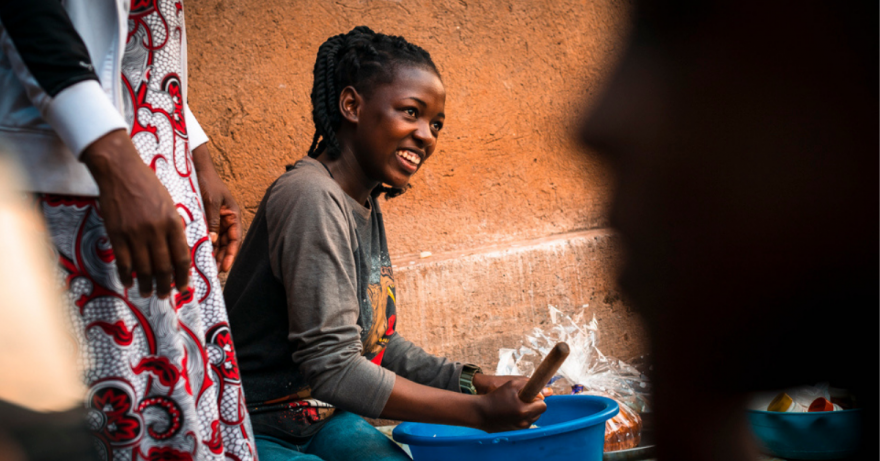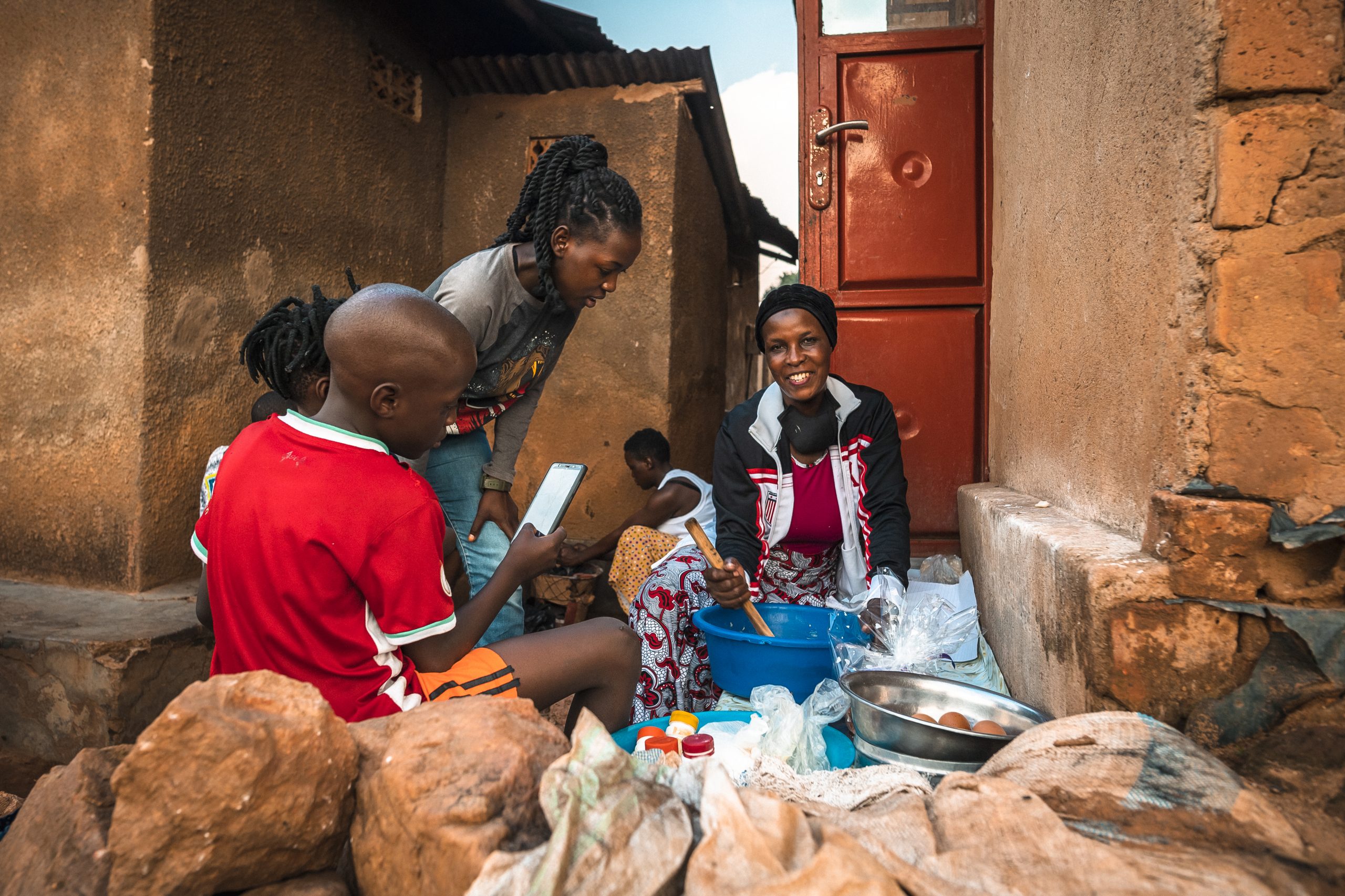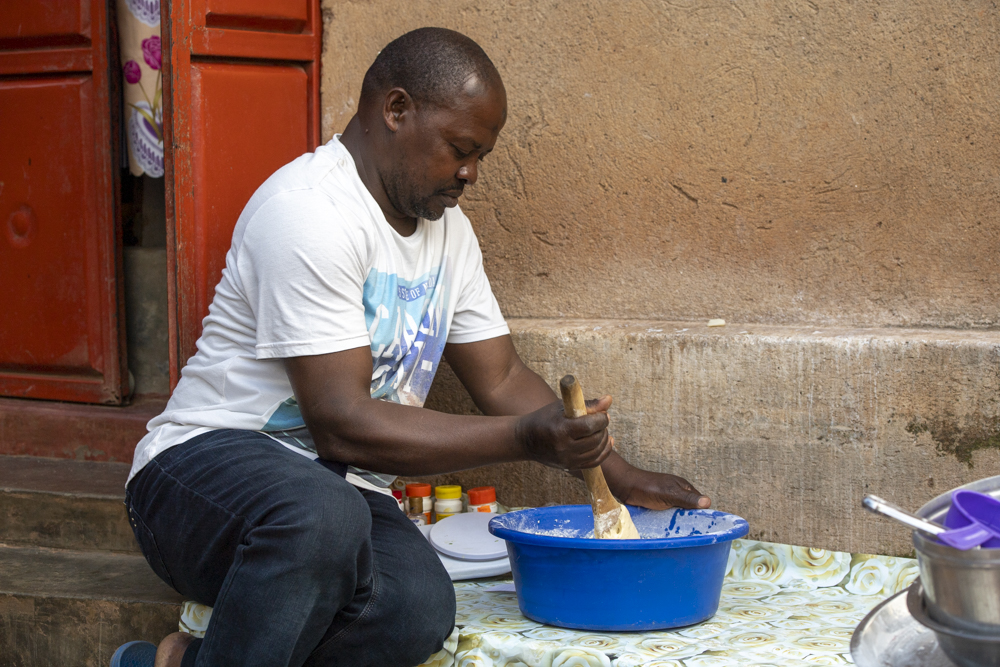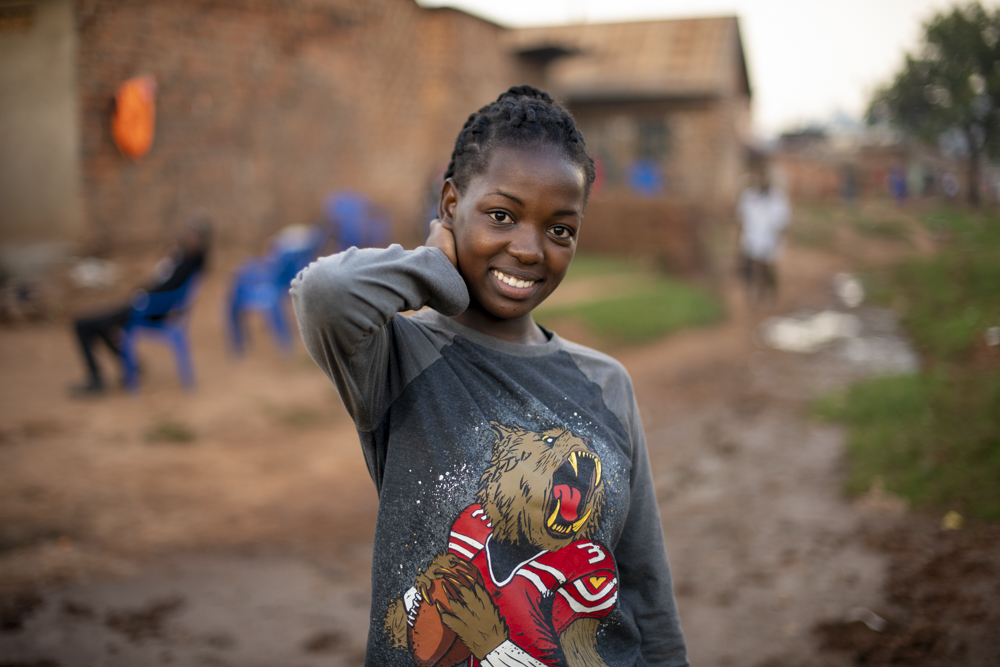Madina’s family bake their way out of Kampala slums

A vanilla cake baked for a birthday party grew into a business that has secured the livelihood of Madina Nabaggala’s family. Savings groups supported by the Women's Bank create opportunities for women to enter the world of work.
CLAY PATHS crisscross a densely built area of low-rise housing and market stalls. Walking on the streets of the Ugandan capital Kampala, our feet raise clouds of red dust and acrid smoke from burning rubbish irritates the throat.
Some boda boda motorcycle taxis fly past us, but most people walk because it’s the cheapest and easiest way to get around. Life is tough for nearly half of Kampala’s 3.5 million residents who live in the unofficial settlements on the outskirts of the city.
In the Kawempe slum we head towards a house whose front yard catches the eye for being so neat and tidy. A shyly smiling woman steps out and spreads a flowery cloth on the porch. We are then surrounded by a lively group of children and young people chatting and laughing. Each seems to be working on some task or another. They are followed by a man who welcomes us with open arms.
It is time to meet the family of champion baker Madina Nabaggala, a member of a women’s group supported by the Women’s Bank and its partner organisation Development and Relief Initiative.

“I’m saving up to get an oven because it is challenging to bake on a charcoal grill,” says Madina Nabaggala. With her income, Madina has been able to pay for the vocational training of her daughter Hairat Nabatanz (right).
Madina Nabaggala, 43
“A few years ago, I heard about the women’s savings and loan group which the Women’s Bank had set up in the area to help women earn their own living. I went along and became the group’s chair.
First, we started a joint soap company, which provided us all with an income. At the same time, we studied accounting and saving and were given the opportunity to raise small loans to start our own businesses. At weekly meetings, we learned many professional and business skills. I’ve always loved baking, so I wanted to learn how to do it better.
I baked my first big cake for my husband’s birthday party. It was a vanilla cake, and all our guests loved it. I started getting customers, and now we are selling up to four cakes a week. One cake costs 35,000 shillings (7.50 euros). We are not short of anything anymore, and I’ve been able to buy clothes and blankets for the kids.
I think it’s very important for a woman to have her own livelihood because she can then take care of her children and decide for herself how to spend the money. This work has made me independent.”

“I am grateful that the Women’s Bank supports the communities that most need their help,” says Hassan Katende.
Hassan Katende, 49
“At first, I had no faith in these women’s businesses. Every now and then, someone promises to empower women, but nothing happens. This place is a slum, and in the end we always get left out of everything.
Then I saw my wife’s bakery start making money. We were able to eat three meals a day and live more comfortably. At the end of the first year, Madina was allowed to withdraw all her savings and she bought us pans and a fridge-freezer and paid for the children’s schooling.
Now I’m helping my wife to bake cakes. And it has been great to see how we have become closer as a family. I’ve started doing housework that used to be my wife’s job. For example, I cook and inspire other men in the neighbourhood to do the same.
The women’s group is the best thing that ever happened to us! It has taught me how to work, too. We’re always finding new ways to generate income. For example, we have started selling popsicles made in the freezer.
I’ve managed to save for a new motorcycle, so now I can offer taxi rides. We also teach saving and financial skills to our children. They have their own box for saving money every week.
I’m so grateful you didn’t just come and give us money, you offered us information. I just wish men had their own savings and loan group.”

“I have inherited my resourcefulness from my mother,” says Hairat Nabatanzi.
Hairat Nabatanzi, 18
“Words aren’t enough to describe how proud I am of my mother. She works hard, and I’ve learned a lot from her about running a business.
I’ve started my own little business, too. I make and sell pumpkin flour, especially for baby food. My own income makes me feel like a queen! I’ve been able to buy myself a mobile phone and help my family.
I am not spending all my money but saving and investing some, for example to buy more ingredients. I sell flour during the week, but at weekends I organise events.
My mother raised a loan from the women’s group so I could attend event organiser training. My studies took a year, and I learned things like how to make decorations.
Now, in addition to selling cakes, we can also offer party decorations! It feels really great.
I think I have inherited my resourcefulness from my mother.”
By Eija Wallenius
Photos by Antti Yrjönen
Main picture: Hairat Nabatanzi helps her mom with her bakery in Kampala, the capital city of Uganda.
